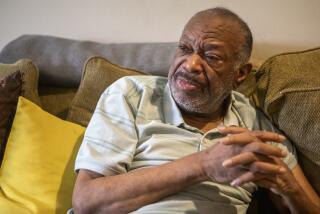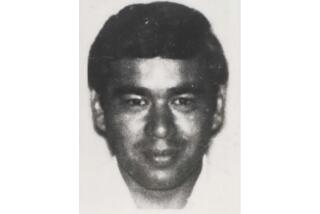Melvin Dummar, who claimed to be heir to Howard Hughes estate, dies at 74
Melvin E. Dummar was driving through the Nevada desert in December 1967 when he stopped to relieve himself and saw, he said, a thin, graying man lying on the ground, bleeding. The only right thing to do was to stop, and so Dummar did.
As he told it, he invited the man into his Chevy, asked him where he wished to go and drove him several hours to Las Vegas. There, on the passenger’s request, Dummar dropped him off behind the Sands Hotel, giving him some pocket change to take on his way.
Dummar, a magnesium plant worker who at the time was en route to Southern California to make amends with his estranged wife, assumed the man was a “bum,” he said years later. But in what he described as a turn that upended his life, he came to believe — and to insist despite widespread doubt — that his desert acquaintance was the reclusive billionaire industrialist Howard Hughes.
Dummar, who made international headlines and inspired the 1980 film “Melvin and Howard” with claims that Hughes had bequeathed him more than $150 million for his act of kindness, died Dec. 9 at his home in Pahrump, Nev. He was 74 and had complications from cancer, said a grandson, Justin Dummar.
“Finding Mr. Hughes out there in the desert has changed my life forever,” Dummar told the Associated Press in 2004. “I was promised about $156 million in his will for saving his life. But I never got a penny of that money and have wound up scorned, sick and nearly broke.”
The legal saga involving the Hughes estate — and Dummar’s claim to a share of it — began shortly after Hughes died in 1976. Hughes, also a noted aviator and Hollywood producer, had amassed a fortune of more than $1.5 billion but became the stuff of sordid legend as he subsisted in a darkened Las Vegas penthouse, rarely if ever bathing, brushing his teeth or trimming his fingernails.
At the time of Hughes’s death, Dummar owned a gas station in Willard, Utah. There, he said, a person described in legal documents as a “confidential agent” of Hughes delivered a handwritten will not long after the magnate’s death.
Dummar initially professed that he did not read the will before taking it to the Mormon headquarters in Salt Lake City, where it soon became public. He later admitted that he had steamed open the envelope to examine the document’s contents.
The will, one of dozens of purported testamentary documents that surfaced after Hughes’s death, left one-sixteenth of Hughes’ estate to the Church of Jesus Christ of Latter-day Saints, as the Mormon Church is officially known, and thus became known as the Mormon will. One-sixteenth also was left to a “Melvin DuMar.”
Almost immediately the international media converged on Dummar, who embarked on a decades-long campaign to collect what he said was his rightful share of the estate and to defend his name against those who considered him a liar.
His legal efforts were in vain. In 1978, a jury in Las Vegas rejected the Mormon will as a fraud after seven months of testimony. Other legal defeats followed.
The case was closed definitively in 2008 after Dummar unsuccessfully sought to reopen the matter, accusing a business representative of the Hughes empire and one of the billionaire’s cousins of conspiring against him in the original proceedings.
Robert Deiro, a former pilot for Hughes, came forward to dispute earlier claims that Hughes never left his home, reporting that he had in fact flown Hughes to a brothel near the spot where Dummar claimed to have discovered him. A former FBI agent, Gary Magnesen, investigated Dummar’s claims and in 2005 published a book largely siding with Dummar, “The Investigation: A Former FBI Agent Uncovers the Truth Behind Howard Hughes, Melvin Dummar, and the Most Contested Will in American History.”
Whatever the official verdict on Dummar, he was firmly established in the cultural consciousness through “Melvin and Howard,” director Jonathan Demme’s film with Jason Robards in an Oscar-nominated role as Hughes and Paul Le Mat as Dummar. Screenwriter Bo Goldman won an Oscar for the film, as did Mary Steenburgen for her supporting role as Dummar’s first wife. Dummar made a cameo appearance.
New York Times movie critic Vincent Canby wrote that the filmmakers “take Melvin’s tale at face value and present the movie as Melvin’s wildest dream. The comic catch is that this wild dream is essentially so prosaic. It’s also touched with pathos since Melvin — in spite of himself — knows that it will never be realized. This is the story of his life.”
Melvin Earl Dummar was born in Cedar City, Utah, on Aug. 28, 1944. He served in the Air Force but was discharged for what was described in news accounts as “emotional problems.”
He worked at various points as a milkman and a frozen-fish salesman, as well as appearing on TV game shows. In recent years he delivered meat and worked in real estate, his grandson said.
He was twice married to and divorced from Linda Diego. Survivors include his wife of more than four decades, the former Bonnie Bonneau, of Pahrump; two children from his first marriage, Darcy Hidalgo and Ferrin Dummar, both of Brigham City, Utah; two stepsons, Don Bonneau of Ogden, Utah, and Ken Bonneau of Roy, Utah; several siblings; and numerous grandchildren and great-grandchildren. A stepdaughter, Sherry Moore, died in 2017.
In the 1980s, Dummar attempted a singing career, a venture that was roughly as successful as his legal claims to the Hughes estate. He had a doo-wop number, according to the Salt Lake City Weekly, that went in part: “Thank you, Howard / For leaving me something / All you left me was frustration / And I’ll never live it down / How I wish you were around. . . . Only you know what went down.”
Langer writes for the Washington Post.
More to Read
Start your day right
Sign up for Essential California for news, features and recommendations from the L.A. Times and beyond in your inbox six days a week.
You may occasionally receive promotional content from the Los Angeles Times.






